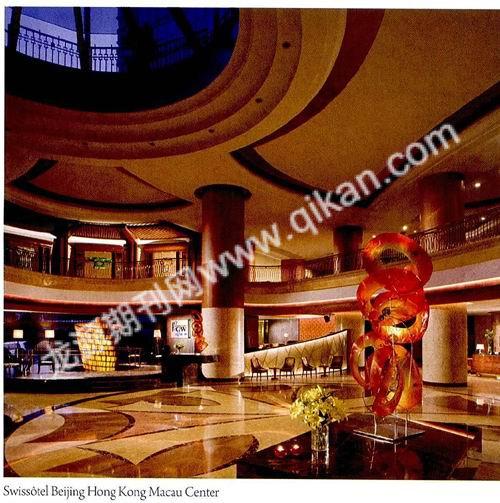Swissôtel——A Promising Brand
2009-09-30YueZhu
Yue Zhu
In late April, Swissôtel Hotels & Resorts launched a “Sustainability Program” in order to maintain the enterprises competitive power and commit to its corporate social responsibility. To know more about Swissôtel Hotels & Resorts, the reporters of CBF interviewed Julian van den Bogaerde, General Manager of Swissôtel Grand Shanghai and Regional Vice-President, China for Swissôtel Hotels & Resorts.

“Swissness”
CBF: Julian, could you please introduce the background of Swissôtel Hotels & Resorts?
Julian: First of all, Id like to talk about our history. Swissôtel was founded in 1980 by Swissair and Nestlé. In April 2001, Raffles International Limited, based in Singapore, acquired Swissôtel, and then, in 2005, the international private investment company Colony Capital acquired Raffles International. In 2006, another well-known company called Kingdom Holding, came together with Colony Capital to own the company. Kingdom Holding is owned by HRH Prince Alwaleed and his family, who have substantial investments in banking, hotels, media and real estates. From this, you can see that Swissôtel is owned by a group of highly-experienced lodging investors.
CBF: On entering the Hotel, we noticed a very special-looking mechanical clock in the Lobby. And the design, décor and service in this Hotel also impressed us a lot. Are all these aspects of “Swissness” that Swissôtel cultivates? Can you tell us more about “Swissness” and the unique brand attributes of Swissôtel?
Julian: Actually, the same clock in our Lobby can be found in many of our hotels worldwide and reflects one of the renowned aspects of Switzerland - horology, which is the art of making fine watches, clocks and timepieces. Very soon, we will also be receiving our second Swiss clock, designed by the eminent Swiss watchmaker Hublot (one of our key partners) which will project a very modern look.

Our brand is distinctive due to unique attributes entrenched in the Companys Swiss heritage. Switzerland shares a boarder with five European countries and three languages are spoken there. As a consequence, you will encounter German, French and Italian influences depending on what part of Switzerland you are in. Despite this diversity, the Swiss generally share the same general attitude of “unity, not uniformity”. Certain characteristics or attributes of Switzerland are held dearly to the heart by all Swiss nationals, without regard to their region, and these same attributes are also firmly based within the culture of Swissôtel.
So while the design of a Swissôtel hotel may vary from destination to destination, to reflect the sense of “place”, and the teams that manage and operate the property are likely to be of different nationalities, Swiss attributes are the common thread which ensures that Swissôtel represent all that is positive about “Swissness”.
In terms of our unique brand attributes, first I want to talk a bit about our Swiss heritage. Switzerland became the holiday playground of Europe in the mid 19th century, and because of this, its hotels began to attract the attention of the rest of the world. But travelers did not go there for the appeal of its cities, as these were no match for Paris, London, Vienna or Berlin. Instead, they rushed to Switzerland for its mountains, its crystal-clear lakes, and its unspoilt countryside and nature. And because of that, the reputation of fine Swiss hospitality was born. Swissôtel maintains these same traditions by utilizing, wherever possible, nature and authentic materials in both design and construction of its hotels, and equipping them with the latest technology, and providing a service quality that is based on honesty and sincerity and genuinely warm hospitality.
On a slightly different note, concerning Swissôtels advancement in China, we have been fortunate to have received a number of highly prestigious awards including the “CRF Chinas Top Employers Award 2009” and the “Starlight Awards 2009 Best International Hotel Management Group in China”. Naturally, we are tremendously honored and proud of this achievement. Yet as we move forward, we will continue to focus on our credo “a passion for perfection”. This credo is essentially what we stand for and this prevails in all that we do. Our unyielding commitment to perfection, centered on our “Swissness” is what makes the difference. And our key competitive advantage is this dedication to perfection.
Sustainability at Swissôtel
CBF: So far as we know, Swissôtel recently launched a “Sustainability Program”. Can you tell us the details of this program and its purpose?
Julian: This program was launched throughout our Company on 22 April 2009, which also coincided with “Earth Day”. Each hotel around the world marked this event with various tree planting activities, either within their hotel gardens or by sponsoring the planting of trees nearby parks or recreational areas.
Swissôtel firmly believes that successful business and a corporate responsibility for sustainable development go hand-in-hand. Each Swissôtel property takes part in the Companys Sustainability Program. The program ensures energy and water conservation, waste separation as well as the purchase of environmentally friendly products.
Actually, energy management is not new to Swissôtel. We feel that just asking our guests if they would like to re-use their towels or would like fresh ones is not enough. We have established “Sustainability Ambassadors” and committees in each of our hotels with the sole purpose of developing and improving environmental awareness and to implement better practices such as buying as many products as possible within a 100-km radius of each hotel.
The general way of thinking about environmental management has been (and probably still is) that it is all to do with energy-saving, and thats the job of the Chief Engineer. But our mindset has changed, and now we think about what each individual team member can do in their personal job environment to support our 4 key pillars of sustainability.
The first pillar is our commitment to Swissôtel customers and stakeholders. We consider our communications with owners, guests, suppliers and other third parties to be a key part of our sustainability approach. We attach great importance to the satisfaction of our guests visiting our hotels, and their health, safety and wellbeing. In addition, we expect high standards from the external companies who supply and service our hotels and have a stringent ethical purchasing policy that all suppliers and subcontractors must comply with.
The second is our commitment to the Swissôtel team. For us, our team is our most valuable asset. We have more than 7,000 people around the World who form our team. We recruit and retain the most talented and motivated people by providing a challenging, motivating environment complemented by competitive salaries, development plans and promotion opportunities.
The third is our commitment to the environment, which is one of the most significant and challenging components of sustainable development. We are committed to improving our eco-efficiency such as our CO2 emissions, energy and water consumption and waste management. We have joined various global environmental initiatives and programs to combat negative environmental trends, and will continue to assess and join other worthwhile environmental programs.
The fourth is our commitment to the community. We want to be part of the communities in which we operate and we aim to be a positive and integral contributor within them. We have frequent communications local organizations and committees and sponsorships and donations are made to good causes whether through financial or non-financial ways. Swissôtel Hotels & Resorts supports SOS Childrens Villages which is an independent, non-politcal and non-demonstrational organization established for orphaned and destitute children all over the World.
Challenges and Opportunities
CBF: Currently, the economic crisis has seriously impacted the global hotel industry, especially the high-end business hotels. How much is Swissôtels business in China influenced? In order to combat the crisis, what measures will Swissôtel adopt besides its sustainability program?
Julian: Throughout China, and in our hotels in other regions, each Swissôtel hotel focuses on cost management. Cost management is an important component of our business model, and we keep it top of mind all the time - not just because of the current economic crisis. We focus on cost management rather than cost cutting as we believe that cost management should never affect our guests. Cost cutting inevitably leads to the lowering of quality, either in products or services. And in order to achieve best practices, we share information openly between our hotels, whether on a country-specific basis, on a regional basis or even on a global basis. In this way we can achieve the best possible outcomes and synergies and achieve our goals.
And having opened two hotels during the last year, in what proved to be already challenging times, I would say that compared to the more established hotels, we are probably in a better situation, Generally, we do not open new hotels with a full compliment of staff. Instead, we tend to initially recruit to about 70%-80% and then, as our business grows, we build our teams further – but always ensuring our service standards are delivered consistently. So at this present time, while some competitor hotels are perhaps looking to downsize their overheads, we are in a different situation, whereby we are actually recruiting, on a strategic basis, as we move forward.
CBF: Whats the importance of the 2010 Shanghai World Expo to Swissôtel? What do you think is the outlook for Swissôtel Hotels & Resorts in China, especially in Shanghai?
Julian: The focus of the world right now is on China. There is a great hope that Chinas economy can kick start the other economies of the World. Although the current economic crisis is likely to continue for a while, I do believe the future is bright and in fact, we have already started to see some signs of recovery - more business people returning to business travel and more leisure travelers.
Our Companys expansion plans in China are very important to us and we had previously intended to create a new learning center here to contribute to the development of talent here in China. I know Shanghai will deliver an impressive Expo in 2010. Events like these only add to the destinations credibility globally and the facilities being provided for Expo 2010 will only add to the destinations future appeal. According to Government estimations, there will be about 5.5 million visitors coming from overseas during Expo 2010. Besides Expo 2010, there are 500 exhibitions expected to be staged in Shanghai during 2010 and further diversification of the Citys leisure offerings are also planned, which is very likely to boost tourism and hotel demand in general.
With 2010 coming soon, the hotel industry in Shanghai is likely to have a golden time once again, and indeed, past that time into the future. I am very confident that the times ahead will ensure that Swissôtel Hotels & Resorts has a bright outlook in China and in Shanghai.
Brief Introduction to Julian van den Bogaerde
Julian van den Bogaerde was appointed Regional Vice-President, China for Swissôtel Hotels & Resorts on March 20, 2009, in addition to his role as General Manager of Swissôtel Grand Shanghai, a post he took up on 1 October 2008. Before coming to Shanghai, he was based in the Head Office of Swissôtel Hotels & Resorts in Zurich, Switzerland, as General Manager. During this time he provided support to various properties around the world. He joined Swissôtel Hotels & Resorts in 2003, transferring from Raffles International Limited where he had held the post of Vice President Food & Beverage from 1999. His previous career appointments took him to various parts of Southeast Asia, as well as Canada, Australia, the UK and other European countries.
